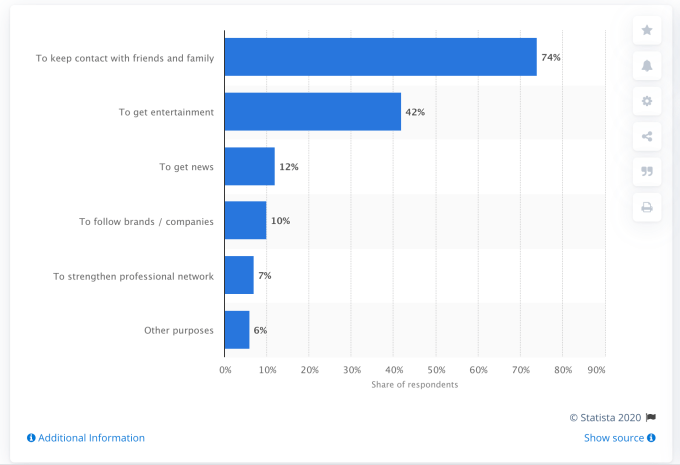Instagram prototypes Snapchat-style disappearing text messages
Instagram is finally preparing to copy Snapchat’s most popular feature, and one of the few it hasn’t already cloned. Instagram has prototyped an unreleased ephemeral text messaging feature that clears the chat thread whenever you leave it, a Facebook spokesperson confirms to TechCrunch. That could make users more comfortable with having rapid-fire, silly, vulnerable, or risque chats, thereby driving up the reply notifications that keep people opening Instagram all day long.

Instagram already has disappearing photo and video messaging which it launched in February 2018 to let users choose if chat partners can “view once”, “allow replay” multiple times for a limited period, or “keep in chat” permanently. Technically you could use the Create mode for overlaying words on a colored background to send an ephemeral text, but otherwise you have to use the “Unsend” feature which notifies other people in the thread.
But today, reverse engineering specialist and TechCrunch’s favorite tipster Jane Manchun Wong unearthed something new. Buried in the code of the Android app is the a new “ ” mode, labeled in the code with the ‘speak-no-evil’ monkey emoji.
” mode, labeled in the code with the ‘speak-no-evil’ monkey emoji.
How Instagram Disappearing Messages Work
When users enter this mode by swiping up from Instagram Direct message thread, they’re brought to a dark mode messaging window that starts as an empty message thread. When users close this window, any messages from them or their chat partners disappear. The feature works similarly to Snapchat, which clears a chat after all members of a thread have viewed it and closed the chat window.

Here’s how Instagram disappearing messages work
The ephemeral messaging feature is not currently not publicly available but a Facebook spokesperson confirms to me that they are working on it internally. “We’re always exploring new features to improve your messaging experience. This feature is still in early development and not testing externally.” The company later tweeted the confirmation. They gave no indication of a timeline for if or when this might officially launch. Some features never make it out of the prototype phase, but others including many spotted by Wong end up being rolled out several months later.
Instagram has seen great success using Snapchat as a product R&D lab. Instagram’s version of Stories rocketed to 500 million daily users compared to just 218 million users on Snapchat as a whole.

But ephemeral messaging has kept Snapchat relevant. Back in late 2017, just 51 million of Snapchat’s 178 million users were posting Stories per day, and that was when Instagram Stories was still in its first year on the market. According to Statista, Snapchat’s top use case is staying in touch with friends and family, not entertainment.
Instagram Stories caused Snapchat to start shrinking at one point, but now it’s growing healthily again. That may signaled that Instagram still had more work to do to steal Snap’s thunder. But Instagram’s existing version of ephemeral messaging that is clunkier, Facebook scrapped a trial of a similar feature, and WhatsApp’s take that started testing in October hasn’t rolled out yet.
That’s left teens to stick with Snapchat for fast-paced communication they don’t have to worry about coming back to haunt them. If Instagram successfully copies this feature too, it could reduce the need for people to stay on Snapchat while making Instagram Direct more appealing to a critical audience. Every reply and subsequent alert draws users deeper into Facebook’s web.
Powered by WPeMatico
Gaming company Scopely adds $200 million more to its M&A stockpile
Scopely, the mobile gaming publisher behind titles including Marvel Strike Force, Scrabble Go, Yahtzee with Buddies and Star Trek Fleet Command, has added another $200 million to its hoard of cash for mergers and acquisitions.
While some startups are fearing a cash crunch, other businesses seem to be preparing to go on a shopping spree. The economic slowdown has many businesses reconsidering their prospects, and it’s a good time for startups and established businesses with lots of cash to consider going on a shopping trip.
With $650 million in venture dollars raised so far, Scopely can certainly consider making some bids. The latest $200 million doubles the amount of money the company closed on for its Series D round. Investors included Advance (the privately held media and publishing company behind Conde Naste and a slew of local news [online and print] publications), and the consumer-focused investment firm, The Chernin Group.
“The FoxNext Games acquisition reinforced our commitment to M&A, and the opportunity to partner with Advance and TCG was a welcome addition to further support our strategy,” said Javier Ferreira, the co-chief executive officer of Scopely, in a statement.
Advance’s investment comes as the company experiments with various new media, entertainment and publishing formats of its own and looks to invest in more digital media companies, according to a statement.
Chernin, a longtime investor in Scopely (since the company’s earliest rounds), said that its investment in Scopely on the heels of closing a $700 million new investment fund was a no-brainer.
“As the traditional media industry continues to go through unprecedented change, we believe that Scopely has all the ingredients for tremendous success — exposure to games (the fastest-growing sector in media), a scalable and durable technology platform, a diversified set of well-known IP, an attractive economic profile, and a team hyper-focused on execution and long-term success,” said Jesse Jacobs, a co-founder and partner at The Chernin Group .
Powered by WPeMatico
Despite canceled trade shows, gaming startups can still win an extra life
As organizers cancel events with massive attendance, like SXSW (400,000 attendees), E3 (66,000), GDC (65,000) and Mobile World Congress (100,000), mobile game developers have felt the crunch. At a show like SXSW, larger developers can spend more than $135,000 just to secure some real estate.
Despite the steep cost, if you’re a developer, these events can prove worthwhile for building awareness, buzz and customer downloads. Real-time feedback from attendees, the ability to sign up users for beta campaigns, opportunities for bolstering subsequent email marketing and the prestige of having your app live side-by-side with games produced by larger studios are unique qualities.
It remains unclear if and how developers that made investments will recover costs such as those for onsite promotion, print advertising, staff for booths and restaurant reservations. Equally, if not more important though, is the added layer of opportunity cost for developers, especially those who sought to use these events to launch something new.
How important are launch moments for game developers? During the Game Developers Conference 2019, a new port of Cuphead for Nintendo Switch was announced. Per Google Trends, web searches for the game reached their second-highest point of the year during the event (March 20th), only behind search volume of the game’s release a month later, in April 2019.
Large developers can come out unscathed from a trade show cancellation and simply kick the launch moment to their next big tentpole event. But for smaller app or game developers that can’t wait another six months for their launch moment, they need to do something.
Here are five ways to salvage a launch lost to a trade show cancellation.
Powered by WPeMatico
GC’s Niko Bonatsos on Y Combinator, edtech and investing in the shadow of coronavirus
This week, Extra Crunch hosted a call with General Catalyst managing director Niko Bonatsos to discuss a number of startup topics, including what the novel coronavirus is doing to investing in the Valley, as well as his thoughts on robotics, homeschooling, edtech, SMBs, international investing and what he’s looking to see today in startups. Joining me on the live call was my fellow Equity host Alex Wilhelm and a couple of dozen EC members.
If you missed this conference call for EC members, don’t fret: We’ll have more of these to come in this era of work-from-home. In the meantime, here is a lightly edited transcript, along with a recording of the call if you’d like to listen in.
Powered by WPeMatico
Just Eat cuts its take for 30 days to help restaurants during the COVID-19 crisis
U.K. takeout marketplace Just Eat has announced a 30-day emergency support package for restaurants on its platform to help them through disruption caused by the coronavirus crisis.
From tomorrow (March 20) until April 19 the package — which Just Eat says is worth £10 million+ — will see funds directed back to U.K. partner restaurants in the form of a commission rebate of one-third (33%) on all commissions paid to Just Eat by restaurants; and via the removal of commissions across all collection orders, which it intends to help reduce pressure on restaurants’ delivery operations, where collection is still available.
Just Eat also said it’s waiving all sign-up fees for new restaurants joining its platform (which must still meet its standard conditions, such as being registered with the relevant local authority as a food business and having the required hygiene rating); and relaxing any existing arrangements that may be in place with partners to enable them to work with delivery aggregators — “regardless of existing contractual terms.”
It added that it will continue to pay restaurants weekly, including the rebate now in place.
Currently Just Eat has around 35,700 restaurants on its platform in the U.K., with delivery available to 95% of U.K. postcodes.
Commenting in a statement, Andrew Kenny, Just Eat’s U.K. MD, said:
These are some of the most challenging times the restaurants we work with have ever been through. We want to show our support and help them to keep their doors open, so they can focus on doing what they do best — delivering food to people across the UK every day. We know our Restaurant Partners are worried about their teams — from chefs to delivery drivers — and these measures will go some way to helping them maintain their operations and support their people.
The food delivery industry has a crucial role to play at this time of national crisis and it is only right that as the market leader in the UK Just Eat steps up to help our independent partners so they can keep delivering for the communities that need them.
In the U.K. and elsewhere there is rising concern about the economic impact of COVID-19 on the hospitality sector as people are told to stay away from social spaces.
On Monday the U.K. government advised people not to go to bars and restaurants or other social spaces in a bid to try to limit the spread of COVID-19. Although, unlike many other European countries, it has not yet issued strict quarantine measures such as ordering hospitality industry businesses to close their doors and citizens to work at home where possible.
On-demand food delivery remains one of the services that continues to operate even in locked down EU Member States. However, with gig economy business models not typically offering platform workers an employment safety net of benefits such as sick pay, the entire sector has come under fresh scrutiny for the legal status it assigns to delivery couriers, given the heightened risks posed to them by the novel coronavirus. In a nutshell, if they need to self isolate, they won’t be able to earn.
In its press release today Just Eat said it’s working on other unspecified support initiatives for couriers, as well as for groups including the vulnerable and isolated, and frontline workers.
These will be announced in due course, it added.
Although it also notes that the vast majority of orders placed through its network are delivered by restaurants with their own delivery capability. Its commission for such orders is a maximum of 14%, it added.
Some on-demand food delivery startups operating in Europe which do rely on gig workers to make deliveries have already announced emergency support funds to help platform workers who fall ill or need to self isolate during the COVID-19 crisis — including U.K.-based Deliveroo and Spain’s Glovo.
There has also been some criticism of how easy it is for couriers to access claimed support.
Powered by WPeMatico
‘Cloud-first’ game studio Mainframe raises $8.1M led by Andreessen Horowitz
With most new social media startups seeming to dial in on specific communities to thrive in a still Facebook-dominated sphere, some of the more broadly focused social investments from top VCs are going into online gaming.
The latest is Mainframe Industries, a Nordic game studio building a massively multiplayer online title. The team doesn’t have much to share of what their title will actually look like gameplay-wise, they’re just saying it’s a sandbox MMO designed for cloud streaming built on Epic Games’ Unreal Engine.
The startup, which has offices in Helsinki and Reykjavik, isn’t building cloud gaming tech but is instead building an MMO title that’s designed from the get-go for streaming platforms like Google Stadia or Microsoft xCloud that beam a title to a user’s device from a cloud-hosted GPU. What does being a cloud-native game entail? Mainly, it seems to mean that they’re creating a social title that is as fully playable on mobile as it is on PC/console.
Building a robust mobile game that meets console/PC gamers expectations has been one of the more tenuous pursuits of the past decade, and one that has more often than not led to watered-down experiences. Mainframe CEO Thor Gunnarsson acknowledges that titles have sometimes catered to the “lowest common denominator,” but he believes that as game-streaming advances lower technical barriers, his team can focus wholly on solving the user experience challenges.
A big focus seems to be leveraging cross-play with more consistent experiences on differently powered devices thanks to cloud streaming. Gunnarsson believes his company’s approach to what occurs on the “social layer” of the title will be what differentiates them the most, though he is mum on details regarding what that will look like in the eventual release.
The startup has some big names supporting them in their quest. The startup announced today that they’ve closed an $8.1 million (€7.6 million) Series A round led by Andreessen Horowitz. Riot Games, Maki.vc, Play Ventures, Sisu Game Ventures and Crowberry Capital also participated in the round.
Andreessen Horowitz, already having bet big on Roblox’s $150 million Series G last month, has been quite active in placing bets on smaller gaming startups in the past year or so, most of which have been made by GP Andrew Chen.
Early last year, Chen directed a16z’s investment in Sandbox VR’s $68 million Series A, a startup aiming to make shared virtual reality experiences more common by building out physical retail locations in malls and shopping areas across the globe. This past August, Chen was also behind the firm’s investment in Singularity 6, another MMO gaming startup that’s looking to build a “virtual society.” Chen was also behind the investment in Mainframe Industries .
“We believe that cloud-native games are poised to revolutionize the entertainment industry in the coming years, yielding entirely new gameplay experiences and business models,” said Chen in a press release announcing the startup’s raise.
In some part, these investments highlight the belief of venture capitalists that online games like Fortnite may represent the future of social networks. They are also, however, platform bets that are rooted in early content plays, which can be notoriously difficult to pick winners in.
While Gunnarsson was quick to discuss how important he believed their title’s social platform would become, he was also just as quick to admit that building a great game was the most critical. “All of the platform stuff is ancillary to the prospect of creating a fun game, but we have really strong game design team.”
Games these days, particularly MMOs, are far from “finished” by launch. Gunnarsson plans to use this round of funding to reach a closed alpha of their title. He didn’t offer any timelines for launch, as they’re only in pre-production now, but did say it certainly won’t be coming out this year.
Powered by WPeMatico
Even in the age of COVID-19, you need to stay focused on the customer
It’s easy to think, as we find ourselves in the midst of a truly unprecedented situation, that the rules of building a successful business have suddenly changed. While the world may be topsy-turvy at the moment, keeping your customer at the center of your business strategy is more important than ever.
That means finding creative ways to engage with your customers and thinking deeply about what they need as the world changes before our eyes.
As a small example on a local level, Pandemonium Books and Games in Cambridge, Mass. has started offering same-day delivery to neighborhoods in the Boston area for a $5 fee and a $20 minimum purchase.
This is taking a difficult situation and finding a way to stay connected with customers, while keeping the business going through difficult times. It’s something that your most loyal customers will certainly remember when we return to some semblance of normalcy — and it’s just a great community service.
When you hear from leaders of the world’s most successful technology companies, whether it’s Jeff Bezos at Amazon or Marc Benioff at Salesforce, these two executives are constantly pushing their organizations to put the customer first.
At Amazon, that manifests itself in the company motto that it’s always Day 1. That motto means they never can become complacent and always place the customer first. In his 2016 Letter to Shareholders, Bezos described what he meant:
There are many ways to center a business. You can be competitor focused, you can be product focused, you can be technology focused, you can be business model focused, and there are more. But in my view, obsessive customer focus is by far the most protective of Day 1 vitality.
Benioff runs his company with a similar world view, and it’s no coincidence that both companies are so wildly successful. In his recent book, Trailblazer, Benioff wrote about the importance of relentless customer focus:
Nothing a company does is more essential than how it engages with customers. In a world where online portals are replacing customer service centers and algorithms are replacing humans on the front lines, companies like ours continually need to show that the personal connections our customers craved were still — and always would be — there.
In our current crisis, that focus becomes ever more important and universal. In his last interview before his death in January, Clayton Christensen, author of the seminal book Innovator’s Dilemma, told MIT Sloan Management Review that while these organizations had other things going for them, customer centricity was certainly a big factor in their success:
They have all built organizations that have put the customers, and their Job to Be Done, at the center. They also have demonstrated the ability to manage emergent strategy well. However, they also have been in the fortunate circumstance where their core businesses have been growing at phenomenal rates, and they have had the presence of the founder to help, to personally get involved in key strategic decisions.
While you don’t want to appear like you are taking advantage of a bad situation, there are ways you can help your customers by thinking of new ways engage and help them in a difficult time. Many companies are offering services for free for the next several months to help customers get through the financial uncertainty we are facing in the near term. Others are posting free content and access to other resources on websites.
While it’s understood that some customers simply won’t have money to spend in the coming months, those that do will have different needs than they did before and you have to be ready to address them, whatever that means to your business.
This virus is going to force us to rethink about a lot of the ways we run our businesses, our society and our lives, but if you keep your customer at the center of all your decisions, even in the midst of such a crisis, you will be setting the foundation for a successful business whenever we return to normal.
Powered by WPeMatico
Quantum Machines raises $17.5M for its Quantum Orchestration Platform
Quantum Machines, a Tel Aviv-based startup that is building both hardware and software to operate quantum computers, today announced that it has raised a $17.5 million Series A funding round. The round was led by Israeli tech entrepreneur Avigdor Willenz (who, among other companies, co-founded Habana Labs and Anapurna Labs and sold them to Intel and Amazon, respectively) and Harel Insurance Investments.
TLV Partners and Battery Ventures also participated in this round. TLV Partners also led the company’s $5.5 million seed round in 2018, in which Battery Partners also participated.
“The race to commercial quantum computers is one of the most exciting technological challenges of our generation,” said Willenz. “Our goal at [Quantum Machines] is to make this happen faster than anticipated and establish ourselves as a key player in this emerging industry.”
The company says it will use the new funding to accelerate the adoption of its Quantum Orchestration Platform. This platform went live earlier this year. What makes it unique is that it’s a combination of custom hardware, which the company designed itself, and software tools that can be used to control virtually any quantum processor. To control a quantum processor, you also need a powerful classical computer, but traditional computers are ill-suited for this task, Quantum Machines argues, and it’ll take specialized hardware for classical computing to harness the power of quantum computing and run complex algorithms on these machines.
“The classical layers of the quantum computer are the real unmet need. They are the bottleneck,” Quantum Machines co-founder Itamar Sivan told me when the platform launched. “We were really looking into what is holding the industry back. What are the things that we can do today to drive this industry forward, but that will also enable faster progress in the future. Since most of the focus in the last years has been devoted to quantum processors, it was only natural that you know we take on this challenge.”
Powered by WPeMatico
Wondering if venture capital is open for business? A new initiative has investors saying yes
A new initiative from a Los Angeles investor is taking stock of venture firms and their ability to commit capital in an effort to match firms that are still open for business and cutting checks to startups that are fundraising in the age of COVID-19.
Laurent Grill, one of the investors at Luma Launch (which is the corporate investment arm of the film studio Luma Pictures), has been working in the Los Angeles venture community building and backing startups for about a decade. Over that time, Grill has put together a fairly impressive Rolodex, and in these times of uncertainty, he’s putting that Rolodex to work.
Most startups are buckling in for a bumpy few months and making tough decisions about when, where and how to get the cash they need to keep their businesses going. While there have been a number of statements on Twitter from various investors about how they’re doing deals and are open for business, Grill is making sure the community can be coordinated so companies know where to turn and investors can find businesses to back in an age of Zoom diligence.
He issued a call on LinkedIn, Twitter and seemingly every other platform requesting that investors who are still cutting checks in the time of the coronavirus sign up (privately) to a list that Grill is managing. There’s also a list for startups that are looking for cash.
We have had an OVERWHELMING response from founders/investors coming together to work to get through this. If you are a company raising or investor investing, please go to this link to submit your information. PLEASE RT to spread the word. https://t.co/u6CRt9Ry5J
— Laurent Grill (@laurentgrill) March 18, 2020
The matchmaking service is designed to save time and energy for entrepreneurs and investors who have to worry about keeping the lights on.
So far, Grill has racked up responses from a lot of the roughly 400 investors to whom he’s sent an email for the initial list he’s putting together.
Luma Launch, as Grill is the first to admit, won’t be among the investors looking at new deals in the near term. As a corporate venture arm, the firm has to manage the portfolio of investments that are already on its balance sheet. That’s a strong list of companies, including The Wave, Community, Lensabl and others that are well-situated to make it through the crisis, but corporate venture is often constrained as their parent companies look internally and new investments aren’t on the short-term horizon.
However, the network that Grill has amassed (although he’s loath to talk about it) includes a number of top investors at some of the largest funds, and they’re all privately telling him that they’re open for business.
Even if Grill isn’t investing, he still wants Luma Launch to play the role in the community that he hoped it always would. “Luma Launch can be that support mechanism that we have been trying to be since day one,” says Grill. “If we can help support entrepreneurs both here in LA and around the country to connect with relevant investors, then we’re all going to be better in the long run.”
In times of uncertainty, it’s best to have a clear and honest understanding of what’s happening in the market, not just performative assurances, says Grill.
“I want to create an ecosystem where everyone can recognize that people are trying to be active,” he says. That’s when I made the public post… I think someone needs to step up and open this up to the general community and the tech community as a whole to help decipher the noise.”
That said, the matchmaking service that Grill hopes to build won’t be open to every company, just the companies that have already raised at least a seed round of funding. For entrepreneurs just getting their businesses off the ground, Grill advises that they focus on building their product and customer base before tapping venture investment.
For established businesses that need additional support, the door remains open. “If you have the capability of helping someone, you have the responsibility to help someone,” Grill says.
Powered by WPeMatico
Remote Year, which helps you work while traveling the world, lays off 50% of staff
Remote Year wants to help people travel around the world and keep their job while doing so. The Chicago startup relies on the idea that “great work can be done anywhere.” And to prove it, it brings people to 12 cities in 12 months, all while they’re working full-time jobs. Think co-working spaces in Ljubljana, code from bungalows in Thailand and workshops from rooftops in Istanbul.
Needless to say, Remote Year’s core business relies on wanderlust, disposable income and the ability to travel.
Citing the COVID-19 pandemic, founder Greg Caplan told TechCrunch that Remote Year has laid off 50% of its staff. The layoff impacted roughly 50 roles on the sales, marketing and product side, and comes less than six months after the company raised a $5 million capital investment from LightBank, which brought its total funding to $17 million, according to Crunchbase data.
“The borders sort of froze up with the virus and a lot of our folks decided not to travel and go home,” Caplan told TechCrunch. “Half of our revenue dried off in a couple of days, and there’s no end in sight when this situation may change.”
The startup says it still has runway from its last capital investment. Layoffs are expected to more largely hit the tech travel industry due to the global pandemic and people staying inside. Earlier this week, travel savings startup Service shut down operations, citing the pandemic and economic downturn.
Remote Year charges between $2,000 and $3,000 a month for its travel programs per person. This includes travel to and between destinations, private rooms and activities. Caplan said that Remote Year staff has always been a distributed team, and by nature of industry, it was “monitoring” COVID-19 for over a month before the onslaught of cancellations and news.
“But monitoring it and talking about it was very different [from] what has unfolded in the last seven days,” Caplan said.
To help the employees that were laid off, Caplan looked inward. Remote Year has always had a three-person team that connects people to remote jobs. That team will be helping its former colleagues through 1:1 coaching, resume interviews, interview preparation and contract negotiations. He urges other founders to do whatever they can to “humanize this” global pandemic, and reach out if needed.
“We’ve actually heard from a couple other companies that want our help finding remote jobs for employees,” Caplan said. “We’re not sure what that means for our business, but we’re going to think about how we can help.”
Powered by WPeMatico




